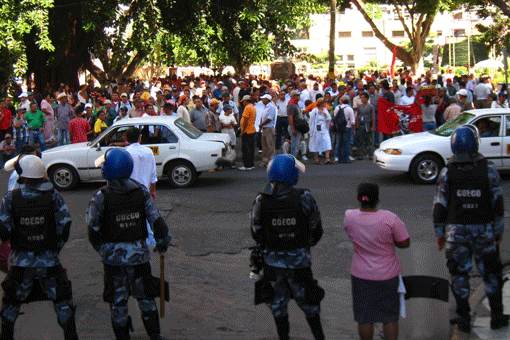Last week, Honduran President Porfirio Lobo Sosa publicly acknowledged that the expulsion of President Manuel Zelaya from the country on June 28, 2009, constituted a coup. This was a startling admission from a man who won last year’s presidential election in a climate rife with fear, repression and censorship. Lobo’s belated recognition of the coup suggests that the pressure to normalize relations with the international community may be getting to him. He has now reversed his earlier position, and in doing so, risked putting himself at odds with allies throughout the Honduran political establishment.
Porfirio Lobo had walked a veritable tightrope on his way to assuming the presidency in January. He was the front-runner well before the June 2009 coup, and the fissure within the Partido Liberal that culminated in the coup all but assured him and his Partido Nacional an electoral victory. There was never any question that Lobo would participate in the elections. But Lobo did not want to appear too close to Roberto Micheletti, the de facto president at the time, for fear of alienating the many Hondurans opposed to Micheletti or the international community that he would have to engage as president.
Days after Zelaya’s expulsion, Lobo explicitly denied that a coup had taken place. Lobo then resorted to dodging the question, blaming Zelaya for provoking the crisis while offering mild critiques of the Micheletti government. By never taking a position against Zelaya’s illegal ouster and Micheletti’s installation as president, Lobo continued to effectively condone the coup. Once in power, Lobo declared amnesty for those involved and rewarded coup supporters. Most notably, General Romeo Vásquez, head of the armed forces that expelled Zelaya, became the head of Hondutel, the national telephone company.
But what are the consequences of Lobo’s public recognition that the events of June 28, 2009, were in fact a coup? If nothing else, it will likely raise concern among the leaders of both dominant parties, the Supreme Court, the armed forces, and the various other state institutions and political players who defended Zelaya’s ouster as a “constitutional succession.” And, with the recent launch of the controversial Truth Commission, those responsible for the coup may fear that Lobo’s pronouncement will pave the way for a more critical and threatening report.
Thus, uttering the simple words “it was a coup,” Lobo has risked alienating domestic political allies and sparking further attacks from the Honduran Right against the Truth Commission.
And, while Lobo’s admission may bring some vindication to those who have opposed the coup all along, it also raises serious questions about his integrity. Unless he argues that he only recently realized that
Why then, would Lobo now acknowledge the coup?
The context of his statement is crucial. Lobo’s coup admission took place in
Soon after assuming power, Lobo basked in the recognition from the
Lobo’s coup admission is most likely just a part of his broader international strategy. By using the same terms as his international opponents to describe last year’s crisis, Lobo may hope to nudge them closer to normalizing relations. This will likely not work with vehement critics like Rafael Correa of
This does not mean that the Truth Commission will uncover the truth about the coup and the guilt of its plotters. Instead, as the Center for Justice and International Law has argued, serious concerns remain about whether the Truth Commission’s mandate and current set-up will ensure a full rendering of the truth, including the litany of human rights abuses perpetrated by state forces after the coup.
Moreover, though Lobos admission makes right-wing denials of the coup even less tenable, it remains difficult to foresee much change from Micheletti’s ardent supporters within Honduras, including most of the pre- and post-election Congress and the Supreme Court. Nor have the country’s three principal newspapers (all of which openly supported the coup, unlike the more neutral newspaper, Tiempo) mentioned Lobo’s recent admission, increasing the odds that the country will lose this opportunity for political debate.
Meanwhile, in the
Lobo’s surprise admission, then, will not likely trigger significant changes in how domestic and international power players view last year’s crisis. And, while observers may hope that Lobo’s statement emboldens the Truth Commission to repudiate last year’s coup and denounce its perpetrators, this outcome, too, remains far from guaranteed. For now, despite Lobo’s radical reversal, uncertainty will continue to prevail in






